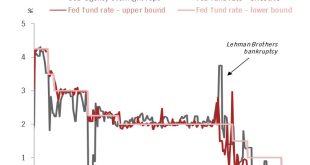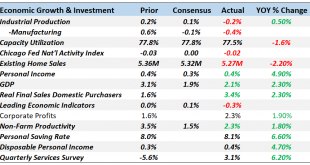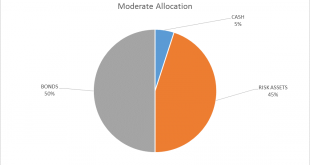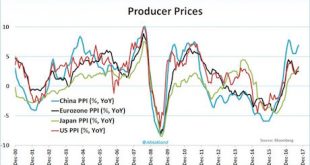The BIS has issued two reports that assess the implications of unconventional monetary policies. The report prepared by the Committee on the Global Financial System discusses … a number of unconventional monetary policy tools (UMPTs). After a decade of experience with UMPTs the report takes stock of central banks’ experience and draws some lessons for the future. The report focuses on four sets of tools: negative interest rate policies, new central bank lending operations, asset purchase...
Read More »Goodbye quantitative tightening
Following this week’s sharp movement in the USD overnight repurchase agreement (repo) rate, people are wondering what the US Federal Reserve (Fed) can do to counter a similar event in the future.One measure of the USD overnight repo rate (there exist several) spiked to 6% on Tuesday 17 September, probably due a scarcity of bank reserves at the Fed at a time when US corporates needed cash to pay their taxes as did investors/banks (probably to absorb strong US Treasury issuance. Hence, cash...
Read More »Monthly Macro Monitor: Does Anyone Not Know About The Yield Curve?
The yield curve’s inverted! The yield curve’s inverted! That was the news I awoke to last Wednesday on CNBC as the 10 year Treasury note yield dipped below the 2 year yield for the first time since 2007. That’s the sign everyone has been waiting for, the definitive recession signal that says get out while the getting is good. And that’s exactly what investors did all day long, the Dow ultimately surrendering 800 points on the day. I don’t remember anyone on CNBC...
Read More »Monetary Policy and the Wealth Distribution
In a Staff Working Paper, the Bank of England’s Philip Bunn, Alice Pugh, and Chris Yeates discuss how monetary policy easing following the financial crisis affected income and wealth of different age groups. The authors analyze survey panel data (ONS Wealth and Assets Survey) on households’ characteristics and balance sheet positions. They argue that the overall effect of monetary policy on standard relative measures of income and wealth inequality has been small. Given the pre-existing...
Read More »Global Asset Allocation Update:
There is no change to the risk budget this month. For the moderate risk investor the allocation to bonds is 50%, risk assets 45% and cash 5%. Despite the selloff of the last week I don’t believe any portfolio action is warranted. While the overbought condition has largely been corrected now, the S&P 500 is far from the opposite condition, oversold. At the lows this morning, the S&P 500 was officially in...
Read More »Bubble Watch: Warning Signs That The Everything Bubble Will Burst in 2018
I believe 2018 will be the year inflation arrives. The reason, as I’ve noted throughout mid-2017, is that multiple Central Banks, particularly the European Central Bank (ECB), Bank of Japan (BoJ) and Swiss National Bank (SNB) have maintained emergency levels of QE and money printing, despite the fact that globally the economy is performing relatively well. All told, in 2017 alone, these Central Banks will printed over...
Read More »Conference on “Aggregate and Distributive Effects of Unconventional Monetary Policies” at the Study Center Gerzensee
Jointly with the Council on Economic Policies and the Swiss National Bank, the Study Center Gerzensee organized a conference on Aggregate and Distributive Effects of Unconventional Monetary Policies. The program can be viewed here.
Read More »Global Asset Allocation Update
The risk budget this month shifts slightly as we add cash to the portfolio. For the moderate risk investor the allocation to bonds is unchanged at 50%, risk assets are reduced to 45% and cash is raised to 5%. The changes this month are modest and may prove temporary but I felt a move to reduce risk was prudent given signs of exuberance – rational, irrational or otherwise. Moderate Allocation - Click to enlarge No...
Read More »Central banks and a sustainable recovery
Published: Friday October 20 2017Mervyn King, Governor of the Bank of England between 2003 and 2013, discusses monetary policy since the financial crisis and what comes next with Cesar Perez Ruiz, Chief Investment Officer of Pictet Wealth Management.You once said that central banks need to be ‘as boring as possible’. Is that still the case today?Central banks should respond to developments in the economy as predictably as possible, so the news should not be about debates within a policy...
Read More »Is This The Best Way To Bet On The Fed Losing Control Of The Bond Market?
Lately, one of my biggest duds of a call has been for the yield curve to steepen. Sure, I have all sorts of fancy reasons why it should steepen, but reality glares back at me in black and white on my P&L run. Sometimes fighting with the market is an exercise in futility. Now I know many of your eyes glaze over when I start talking about different parts of the yield curve flattening or steepening, but I urge you to...
Read More » Swiss Economicblogs.org
Swiss Economicblogs.org







